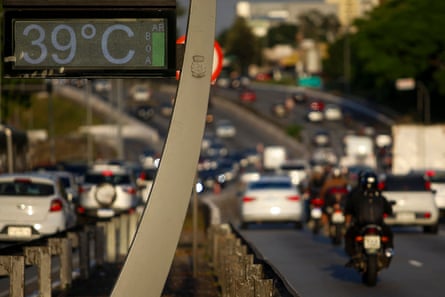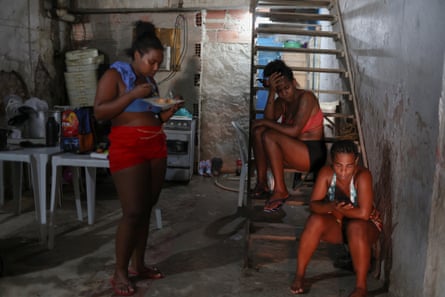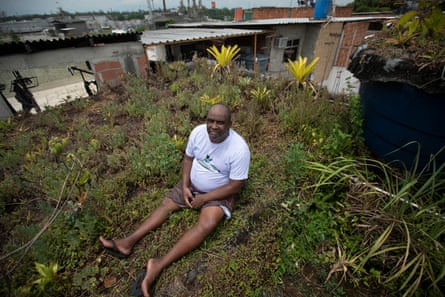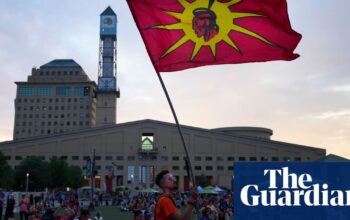Even though it’s still a month away, Brazil has already had its eighth heatwave of the year in the southern hemisphere summer. Temperatures are reaching dangerous levels.
Inmet, the national meteorological institute, issued a red alert this week for significant portions of the country. The alert cautioned about potential health hazards and even the possibility of loss of life due to temperatures remaining at least five degrees Celsius above the usual average for more than five consecutive days.
The risks were highlighted by the passing of a fan at a Taylor Swift show on Friday evening in Rio de Janeiro. According to reports, numerous other attendees had to receive medical attention for dehydration.
According to reports, Ana Clara Benevides Machado, a 23-year-old, suffered a cardiac arrest and passed away at the Estádio Olímpico Nilton Santos stadium due to extreme heat, with temperatures reaching well above the official measurement of 39.1C outside.
The vocalist joined both followers and public officials in conveying her dismay over the passing. On social media, Swift shared that she was “heartbroken” by the update and “overcome with sadness”.
At the beginning of the performance, it was reported that fans were continuously calling out for “water, water, water” towards the stage. This was said to be due to them supposedly being prohibited from bringing their own supplies into the stadium.
Flávio Dino, Brazil’s justice minister, announced on X that emergency regulations would be enforced mandating recreational establishments to provide water access for fans. It was anticipated that other politicians in the area would also adopt similar measures.
After experiencing the hottest July, August, September, and October in Brazil’s history, the current temperatures are predicted by the MetSul weather company to “rewrite climate history” in the country. The intense heat can be partially attributed to a powerful El Niño, and the climate crisis has increased the likelihood of these extreme events.
The thermometers used by Inmet recorded temperatures above 40C multiple times in the center-west and south-east regions. The highest temperature, 43.3C, was recorded in Corumbá, which is located on the border with Bolivia, on Wednesday. São Paulo and Rio de Janeiro also saw record-breaking temperatures for the year, reaching 37.7C and 42.6C, respectively. In Rio, which is often referred to as “Hell de Janeiro” by residents, the “feels-like” temperature reached a shocking 59.7C on Saturday.

Office workers who typically work remotely returned to air-conditioned buildings to avoid the intense heat and expensive electricity costs. However, this was not possible for individuals like Flávio Figueiredo, a moto-taxi driver in the favela.
The heat “makes work more stressful”, said the 42-year-old, sheltering in the shade of a tree at the entrance of Parque Arará, a favela located off Avenida Brasil – one of Rio’s busiest and most polluted thoroughfares – and backing onto an oil refinery.
He mentioned that if the temperature is around 30 degrees Celsius, it may feel like 40 or 50 degrees when you stop on the tarmac.
Similar to other places, Brazil’s significant disparities in society are made more apparent by severe weather occurrences.
Marina Marçal, a climate policy specialist advising the Brazilian government, explains that the true consequences of a heatwave are not idyllic images of bustling beaches. Instead, it involves crowded buses with malfunctioning air conditioning and schools lacking proper cooling systems. This highlights the issue of climate injustice and the need for action in addressing it within both climate and urban policies.

“Less affluent regions, such as favelas, experience the highest levels of urban heat,” explained Andrews Lucena, a geographer from the Federal Rural University of Rio de Janeiro who researches extreme urban heat. “Favelas are particularly susceptible to heat due to their poor building materials, lack of green spaces, and prevalence of unfinished construction, which leads to a build-up and excess of heat.”
Ignore the advertisement for the newsletter.
after newsletter promotion
Frequent power and water outages are a common issue for residents of favelas, who often rely on secret connections to the grid for electricity.
Luis Cassiano Silva, a resident of Arará, expressed that public authorities do not pay attention to their community and make no attempt to make improvements. He attributed this to systemic racism. Silva, along with 56% of Brazilians and 67% of favela residents, identifies as Black.
The intense heat of the favela was a constant source of discomfort for the 54-year-old, who had previously resided in greener neighborhoods and had a tendency to sweat excessively. In response, he decided to take action and installed a green roof on his home twelve years ago. He collaborated with experts from the Federal University of Rio de Janeiro to develop a prototype that could be implemented on less stable structures.
The thriving rooftop garden now helps to keep the terrace below significantly cooler. “It’s beautiful,” remarked the environmental advocate, before expressing, “but honestly, it’s scorching hot… and it’s only getting hotter.”

According to Inmet meteorologist Dayse Moraes, the heatwave was predicted to reach its peak during the weekend, but there could be an even hotter summer in store.
Marileidi Francisco, a 42-year-old shopkeeper in Arará, expressed her concerns about the increasing heat and how it may affect their ability to cope.
Silva attempted to duplicate his cooling roof, but while his Teto Verde Favela initiative successfully added greenery to the square where Figueiredo sought shade from the sun, the garden roofs have not gained much traction in Parque Arará. The area remains a scorching mix of red and grey, with brick and corrugated iron.
Residents can beat the heat by taking an outdoor shower or enjoying a cold beer at the bar, according to Silva. He wiped his sweaty forehead as nearby gang members, who run the neighborhood, cooled off in a makeshift pool on the street.
Source: theguardian.com


